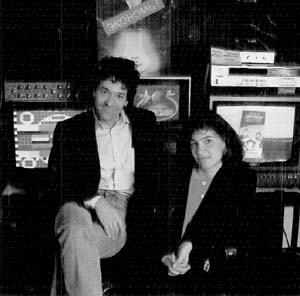It sounds like a Michael J. Fox fantasy: A rock-music buff and electronics hobbyist parlays his two passions into a lucrative career as a kind of unofficial cultural envoy to the Soviet Union. But it is the real-life story of Ken Schaffer, 39, of New York City, who, with the help of Marina Albee, 26, a Columbia University graduate student, has created a thriving business bringing Soviet TV shows, movies and rock groups to the U.S. and Japan.
After dropping out (3 credits shy of an engineering degree) of the City University of New York in 1969, Schaffer worked as a publicist for several entertainers, including the rock guitarist Jimi Hendrix. On the side he tinkered in electronics, inventing the wireless guitar, which uses a tiny radio transmitter to send signals to a nearby amplifier. In 1984, Schaffer developed a satellite dish that is able to pick up Soviet signals in the U.S. His company, Orbita Technologies, has sold seven of them to individuals and universities for up to $55,000 each.

In Mikhail Gorbachev’s era of openness, Schaffer became convinced that cultural exchanges between the Soviet Union and democratic countries would pick up.
So in January 1986 he formed his venture with Albee, who speaks Russian. Their plan: to match Soviet entertainment that they find through Soviet government officials with U.S. promoters and producers. Schaffer and Albee collect either a flat fee or percentage of the performers’ fees from promoters and producers.
Last December Schaffer and Albee arranged for the Soviet band Stas Namin to appear at a rock concert in Japan. In February they persuaded a U.S. cable-TV network, the Discovery Channel, to telecast 66 hours of live Soviet news, documentary and variety programs to 14 million U.S. homes.
Now they are trying to set up a U.S. recording session for a Leningrad rock group. Says Schaffer, who claims he would never have found his new career had not the satellite dish brought him into contact with Russian culture: “The invention is changing the inventor.”
By Teresa Tritch
